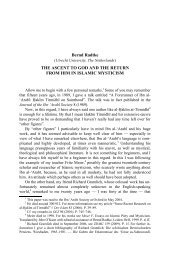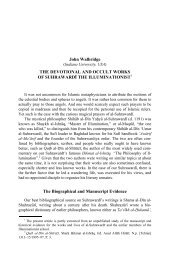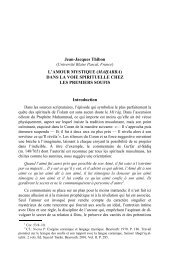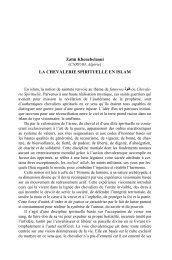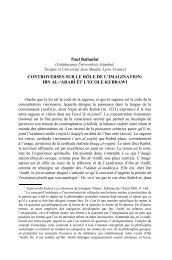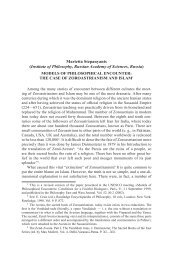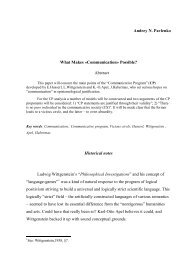Bothius talk DEF
Bothius talk DEF
Bothius talk DEF
You also want an ePaper? Increase the reach of your titles
YUMPU automatically turns print PDFs into web optimized ePapers that Google loves.
16<br />
guise of the present moment, a kind of image of eternity's eternal present, it lends to whatever<br />
it touches the appearance of existence 62 .<br />
To understand this notion, we need to bear in mind the basic structure of the Late<br />
Neoplatonic theory of time. Beginning with Iamblichus, the Neoplatonists proposed a threelevel<br />
hierarchy, in line with the doctrine of the triple universal, according to which each<br />
Intelligible Form or Idea has three phases: unparticipated, participated, and in the<br />
participants 63 . Corresponding to the unparticipated Form is Eternity (Greek aiôn), followed by<br />
two kinds of time: corresponding to the participated Form, an intellectual time that is stable,<br />
motionless, and partless, and generative; and corresponding to the participants, the time we<br />
experience in the sensible world, which is generated and constantly flowing.<br />
As Sambursky explains, this inferior time flows from the future into the past along the<br />
sides of a triangle (Table 1), and only at the vertex of the triangle does the flowing now that<br />
constitutes our present moment touch the immobile Intellectual time which is a direct<br />
emanation from, and therefore image of eternity. This is, as it were, the metaphysical<br />
background for Boethius' assertion that the now represents our only point of contact with<br />
eternity, an idea he shares with Damascius, for whom the present instant is a “trace of<br />
eternity” (ikhnos aiônion) at which eternity comes to be with time (en khronôi to aei on<br />
estin) 64 .<br />
Since, according to Boethius' second principle, every nature understands what's<br />
subject to it according to its own nature, and God's nature is always eternal and praesential, it<br />
follows that his knowledge remains in the simplicity of his presence, embracing the infinite<br />
extent of the past and future, considering everything in his simple cognition as if it were<br />
happening now 65 . The presence by which God discerns everything should be characterized not<br />
so much as foreknowledge (praescientia) of the future as knowledge of a never-deficient<br />
instant; it should be called providence (pro-videntia) rather than foreknowledge, where the<br />
62 Consol. 5, 6, 12: huius exigui uolucrisque momenti, quae quoniam manentis illius<br />
praesentiae quandam gestat imaginem, quibuscumque contigerit id praestat ut esse uideantur.<br />
63 Cf. Iamblichus, In Tim., fr. 60 Dillon; Proclus, Elements of Theology, prop. 24<br />
64 Damascius, In Parmenidem, II, 12 3 .c 1 , vol. III, p. 189, 20 Westerink-Combès. Similarly,<br />
although more colorfully, Meister Eckhart describes the now as “a taste of eternity” (Nû...ez<br />
ist wol ein smak der zît, cf. Werke, ed. N. Largier et al., 2 vols., Frankfurt a.m. 1993, vol. 2, p.<br />
48). For the concept of the eternal now in the philosophy of Proclus, cf. Roth 2008..<br />
65 Cf. Cons. 5.c2.11-12: quae, sint, quae fuerint, veniantque/uno mentis cernit in ictu.



